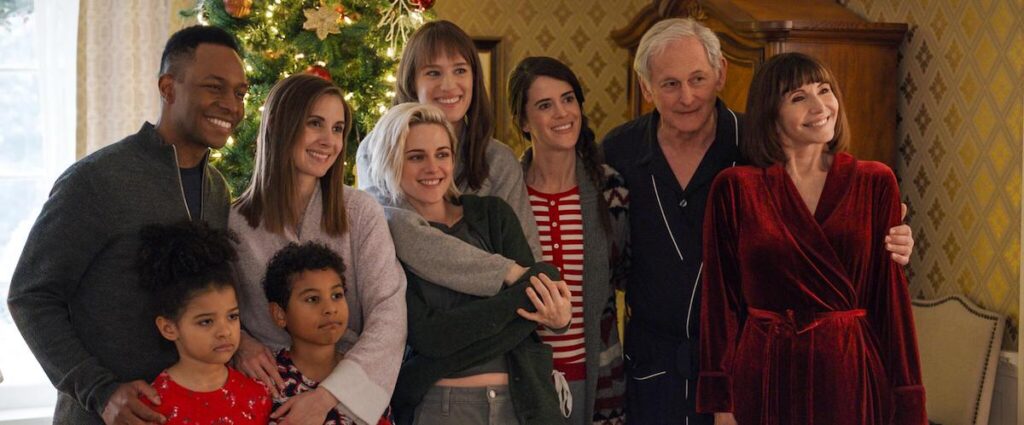Happiest Season is a regressive disaster of a holiday narrative
Written by Ian Thomas Malone, Posted in Blog, Movie Reviews, Pop Culture
Coming out is an almost universally brutal aspect of the LGBTQ experience. Even under the best of circumstances, the process is bound to be full of cringe and bent-up anxiety. A byproduct of the efforts at broader LGBTQ visibility has been the de-stigmatization of being gay as a whole, painting apocalyptic reactions toward coming out with a rightful shade of taboo.
Happiest Season presents its narrative in a world where being gay is still something to be embarrassed or ashamed about. Harper Caldwell (Mackenzie Davis) pushes her girlfriend Abby (Kristen Stewart) back into the closet for a visit to her family, after lying to Abby about having come out to them already. Not only are Harper’s parents very conservative, her father Ted (Victor Garber) is running for mayor.
This is the world that Happiest Season shapes for its spin on classic holiday tropes. Dick Cheney was elected vice president in the 2000 election on a Republican ticket while having a gay daughter. Twenty years later, the same dynamic apparently appears to be a subject of great scandal for a small-town mayoral contest. The film doesn’t really explicitly state its location, but it’s hard to imagine where, or frankly when, this mess is supposed to take place.
Harper’s parents’ issues aren’t simply limited to homophobia either. Her sister Jane (Mary Holland) is treated like a pariah, a subject of immense, open disdain and mockery from the rest of her family. Harper’s mother Tipper (Mary Steenburgen) is comically rude, abusing Abby for being an orphan right as they walk through the door. As if that wasn’t enough, Sloane (Allison Brie) makes her introduction late in the first act, a formerly successful lawyer in the middle of a crumbling marriage.
The Caldwell family are horrible people with seemingly no redeeming qualities. Director Clea DuVall, who also co-wrote the screenplay, throws them out there like we’re supposed to laugh along with these truly loathsome individuals. The dialogue is often pretty terrible. The cast, which also includes Dan Levy and Aubrey Plaza, is way overqualified for this disaster, unable to make much out of the sloppy writing.
The real rot at the core of Happiest Season lies with Harper. We’re never really given a solid reason for why she feels it’s okay to push the love of her life back into the closet, an immensely inappropriate proposition in the modern era. Not only does the film push an unhealthy dynamic on gay people, it never really tries to justify itself. Davis gives a pretty wooden performance, unable to elevate her character beyond the laughably stale tropes.
DuVall does try and grapple with this dynamic late in the third act, but by then it’s well past the point of redemption. There are too many feints toward subplots that don’t really go anywhere, squandering time that could have been spent salvaging the Caldwell family. Family is complicated, but this family is so deplorable beyond their homophobia that it’s hard to care much about resolution. These aren’t the kinds of issues that can be solved in a single holiday.
LGBTQ people don’t have a ton of holiday staples to call our own. In some ways, Happiest Season doesn’t really fit this category either. It features gay people in lead roles, but this film caters almost exclusively to the guilt that heterosexual families might feel for their past behavior toward gay children. Everyone can take solace in the fact that they aren’t as mean as the Caldwell’s, but that’s not a very good message to send regarding inclusivity.
Happiest Season is a sloppy, regressive mess full of one-note characters. This film sends all the wrong messages about tolerance in the year 2020. A lot of talent were involved in the making of this film. What a shame.











